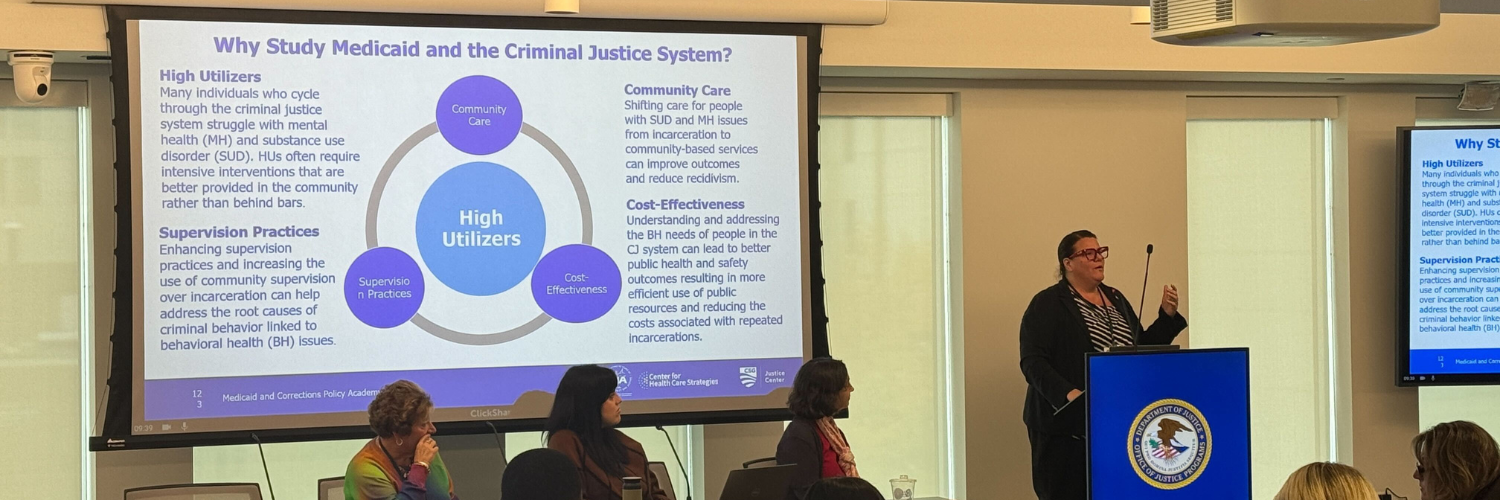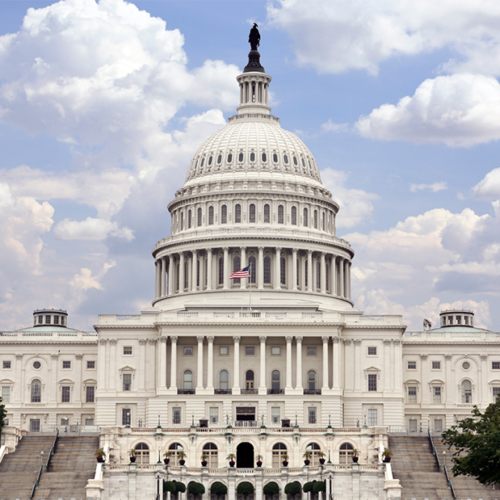
The Council of State Governments (CSG) Justice Center and Center for Health Care Strategies (CHCS) are pleased to announce that three states—Arizona, Montana, and New Hampshire—are serving as mentor states in the Medicaid and Corrections Policy Academy, funded by the Bureau of Justice Assistance (BJA). These states are leading the field through their work at the critical intersection of health care and criminal justice by participating in the Medicaid Section 1115 Reentry Demonstration opportunities and other efforts to leverage Medicaid to support reentry services for people returning to their communities.
Arizona
Arizona’s Section 1115 Demonstration waiver, “Arizona Health Care Cost Containment System (AHCCCS),” was approved by the Centers for Medicare & Medicaid Services (CMS) in December 2024. The waiver allows the state to provide services 90 days prior to release for Medicaid-eligible individuals in state prison, jail, youth correctional facility, or Tribal correctional facility.
“Arizona Health Care Cost Containment System (AHCCCS) is thrilled to participate as a mentor state in the Policy Academy,” said Carmen Heredia, director of AHCCCS. “Leveraging Medicaid health care coverage and coordination of services provides an effective means of success for reentry transition, helping formerly incarcerated people ease back into healthier living outcomes and reduce recidivism. We believe in the importance of meaningful reentry services and are proud to work in this space with our many partners in Arizona. We are excited to learn from others and hope to be helpful to other states as they start their journey in reentry work.”
Montana
Montana’s waiver, “Healing and Ending Addiction through Recovery and Treatment Demonstration (HEART),” was approved by CMS in February 2024. This waiver allows the state to provide targeted services 30 days before release to Medicaid-eligible people in state prisons who have a substance use disorder and/or mental health diagnosis.
“The Montana Department of Corrections is honored to serve as a mentor in the Medicaid and Corrections Policy Academy,” said Cindy Hiner, health services bureau chief at the Montana Department of Corrections. “Thanks to the leadership of Montana Governor Greg Gianforte through his HEART Initiative and the department’s partnership with the Montana Department of Public Health and Human Services, we are in a position to share best practices that will help improve outcomes and support individuals reentering their communities. Supporting returning citizens with mental health challenges and substance use disorders is critical, as well as providing strong case management, in-reach services, and continuity of care upon transition.”
New Hampshire
New Hampshire received an extension of their waiver, “Substance Use Disorder, Serious Mental Illness, and Serious Emotional Disturbance, Treatment Recovery and Access,” in July 2024. The waiver included a new program, the Reentry Demonstration Initiative, to provide services 45 days before release for Medicaid-eligible people with certain behavioral health conditions who are residing in a state or local jail or a state prison. New Hampshire, like Montana, is now planning for the implementation of their waiver.
How the Mentor States Will Engage Academy Participants
The Medicaid and Corrections Policy Academy was launched by BJA to bring together senior leaders across state Medicaid, corrections, and behavioral health agencies. Each state team of leaders is working to develop a shared vision for reentry services, build partnerships, and identify strategies to harness Medicaid’s potential to improve health coverage access, quality of care, and reentry outcomes. With Arizona, Montana, and New Hampshire serving as mentor states, participants are benefiting from insights into successful planning and implementation strategies for coordinating Medicaid-financed reentry services.
In addition to sharing knowledge about leveraging Medicaid to support reentry and the waiver process, mentor states are able to join virtual trainings and gain access to specialized technical assistance with national experts while contributing to growing peer-to-peer connections across states. For example, on October 27 and 28, they joined an in-person meeting in Washington, DC, to share their insights with state teams on topics such as best practices for streamlining Medicaid for people during reentry; facilitating connections to primary care and chronic disease treatment upon reentry; effective cross-sector information and data sharing; and integrating mental health and substance use treatment in correctional settings. Mentor states also provided consultation to teams during the development of their action plans to support their ongoing reentry work.
For more information, please contact Sarah Wurzburg at swurzburg@csg.org, who leads Second Chance Act Health and Housing training and technical assistance.
This project was supported by Grant No. 15PBJA-23-GK-05504-MUMU awarded by the Bureau of Justice Assistance. The Bureau of Justice Assistance is a component of the Department of Justice’s Office of Justice Programs, which also includes the Bureau of Justice Statistics, the National Institute of Justice, the Office of Juvenile Justice and Delinquency Prevention, the Office for Victims of Crime, and the Office of Sex Offender Sentencing, Monitoring, Apprehending, Registering, and Tracking. Points of view or opinions in this document are those of the author and do not necessarily represent the official position or policies of the U.S. Department of Justice.
Photo credit: Lacy Adams, CSG Justice Center
When returning to their communities from criminal justice settings, people with behavioral health needs face barriers in accessing…
Read MoreThe Council of State Governments (CSG) Justice Center has launched the Collaborating for Youth and Public Safety Initiative…
Read MoreA bipartisan group of 88 lawmakers, led by Representatives Carol Miller (R-WV) and Danny Davis (D-IL), wrote a…
Read More Assigned to the Cloud Crew: The National Incarceration Association’s Hybrid Case Management for People with Behavioral Health Needs
Assigned to the Cloud Crew: The National Incarceration Association’s Hybrid Case Management for People with Behavioral Health Needs
When returning to their communities from criminal justice settings, people with behavioral…
Read More Six States Commit to Improving Statewide Strategies to Address Youth Crime, Violence and Behavioral Health
Six States Commit to Improving Statewide Strategies to Address Youth Crime, Violence and Behavioral Health
The Council of State Governments (CSG) Justice Center has launched the Collaborating…
Read More Bipartisan Group of 88 Lawmakers Push for Continued Funding for Reentry and Recidivism Programs
Bipartisan Group of 88 Lawmakers Push for Continued Funding for Reentry and Recidivism Programs
A bipartisan group of 88 lawmakers, led by Representatives Carol Miller (R-WV)…
Read More










